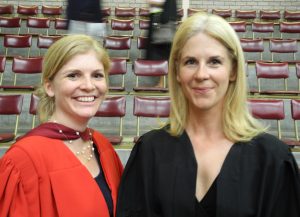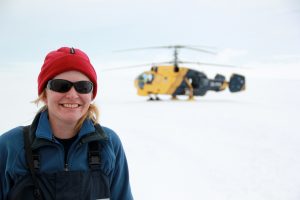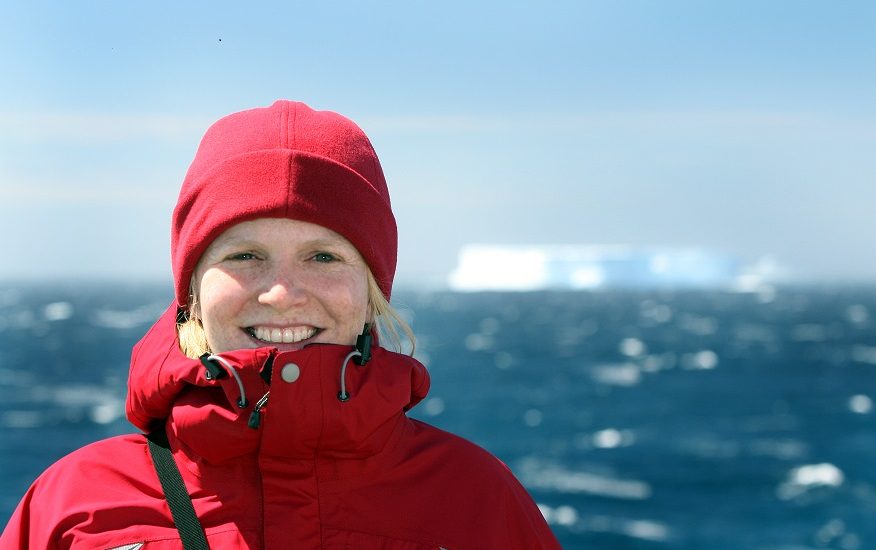Lize-Marié van der Watt in Antarctic waters in the summer of 2010/2011
Lize-Marié van der Watt conducted her PhD research over the period 2009 to 2012 in the Department of History of Stellenbosch University on the build up to, and the initiation and development of South Africa’s National Antarctic Programme. She worked closely with the predecessor project to the Antarctic Legacy of South Africa, researching government and museum archives in South Africa, the UK and the USA for original sources. She also went on a number of road trips within South Africa together with Dora Scott, conducting oral interviews with veteran team members of the three South African bases on Marion and Gough Islands and at SANAE IV in Dronning Maud Land, Antarctica, as well as with scientists and support staff involved with SANAP.

Lize-Marié joined two SANAP relief expeditions: to Marion Island in 2009 (when she got to walk round the island overnighting in coastal field huts and also climbed it highest peak) and to SANAE IV over the 2010/2011 summer.
Lize-Marié van der Watt is now based in Stockholm, Sweden at the Division for History of Science, Technology and Environment, KTH Royal Institute of Technology, where she continues researching histories of polar pasts and polar futures. Her research publications include socio-environmental and political histories of South Africa and Antarctica.
She writes: “I am currently focusing on Arctic research, where I have three main interests: Arctic geopolitics and knowledge communities, with specific reference to global environmental change; future narratives for responsible development that draw on present and past imaginings of the future; as well as comparative histories of Arctic scientific institutions during the Cold War” (click here). While working on Arctic matters a steady stream of Antarctic publications emanating from her PhD research continues to emerge in the peer-reviewed literature, as listed below.
Her PhD thesis abstract follows:
“This study addresses a little-known but important part of South Africa’s history: its involvement with the sub-Antarctic and Antarctic in the twentieth century. It has a three-fold approach. Firstly, it provides insight into the motives driving South Africa’s investment in the region, from the first call for a South African Antarctic expedition in 1919 to the post-apartheid recommitment to the South African Antarctic Programme. Interrogating of the reasons behind South Africa’s activities in this region – including those that failed –throws into relief broader issues about how and where South Africa saw itself in the geopolitical order. As such, this dissertation is situated within a body of Antarctic scholarship that seeks to subvert the prevailing homogenising narrative of the continent as simply the preserve of scientists and heroes. In particular, it investigates how tropes of imperialism and nationalism functioned in these remote corners of the world. Secondly, this dissertation investigates how changing perceptions of the extreme environment of Antarctica, and specifically the Prince Edward Islands, can add to our understanding of environmental history. It also shows how the values projected onto and invested in the environment as ‘nature’ changed over time. Thirdly, it takes into account the humans that were South Africa’s presence in the region and how the underlying patterns in the fabric of South African society, including race and gender, crystalized on the Antarctic continent.”

With thanks to Lize-Marié van der Watt.
Antarctic publications by Lize-Marié van der Watt
Roberts, P., Dodds, K. & van der Watt, L.-M. 2013. “But why do you go there?” Norway and South Africa in the Antarctic during the 1950s. In: Sverker Sörlin, S. (Ed.). Science, Geopolitics and Culture in the Polar Region: Norden beyond Borders. Farnham: Ashgate. pp. 79-107.
Roberts, P. Howkins, A. & van der Watt, L.-M. 2016. Antarctica: a continent for the humanities. In: Roberts, P. Howkins, A. & van der Watt, L.-M. (Eds). Antarctica and the Humanities. London: Palgrave Macmillan. pp. 1-23.
van der Watt, S.M.E. [=L.M.] 2012. Out in the Cold: Science and the Environment in South Africa’s Involvement in the sub-Antarctic and Antarctic in the Twentieth Century. PhD thesis, Stellenbosch University, Stellenbosch. 255 pp.
van der Watt, L.-M. 2013. Return to Gondwanaland: South Africa, Antarctica, minerals and apartheid. The Polar Journal 3: 72-93.
van der Watt, L.-M. & Swart, S. 2015. Falling off the map: South Africa, Antarctica and Empire, c. 1919–59. The Journal of Imperial and Commonwealth History 43: 267-291.
van der Watt, L.-M. & Swart, S. 2016. The whiteness of Antarctica: race and South Africa’s Antarctic history. In: Roberts, P. Howkins, A. & van der Watt, L.-M. (Eds). Antarctica and the Humanities. London: Palgrave Macmillan. pp. 125-156.
van der Watt, L.-M. 2017. Contemporary environmental politics and discourse analysis in Antarctica. In: Dodds, K. Hemmings, A. & Roberts, P. (Eds). Handbook on the Politics of Antarctica. Cheltenham: Edward Elgar. pp. 584-598.
John Cooper, Principal Investigator, Antarctic Legacy of South Africa, Department of Botany and Zoology, Stellenbosch University, 24 January 2017

